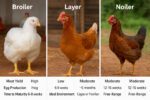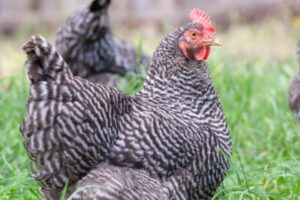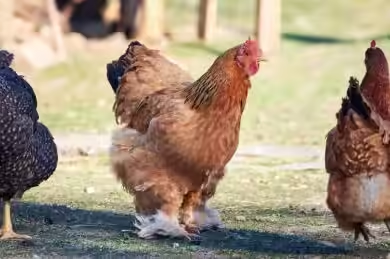Last updated on July 22, 2025
Thinking about starting a backyard flock or adding a new breed to your coop? If you want chickens that are hardy, productive, and easy to manage, Plymouth Rocks are a top pick. These classic American birds are perfect for beginners and experienced keepers alike, and they thrive in both free-range and backyard setups.
Here’s everything you need to know about Plymouth Rocks—from their history and personality to practical care tips and real-world results.
Key Takeaways: Plymouth Rock Chickens
- Calm, friendly, and great for families or beginners
- Consistent layers of large brown eggs (200–280 per year)
- Hardy in both cold and hot climates
- Dual-purpose: excellent for eggs and meat
- Low maintenance and long-lived (6–8 years, sometimes up to 10)
- Integrate well with other breeds and rarely show aggression
- Outstanding foragers—help control pests and reduce feed costs
What Makes Plymouth Rock Chickens a Top Choice for Backyard Flocks?
Plymouth Rocks have been a staple of American poultry yards since the 1800s. They were bred to be reliable egg layers and provide a good amount of meat, making them a true dual-purpose breed. Their calm temperament, adaptability, and resilience make them a favorite for backyard keepers across the country.





“The Plymouth Rock is one of the oldest and most successful dual-purpose breeds in America. They are known for their hardiness, docility, and excellent egg production.”
— Dr. Jacquie Jacob, University of Kentucky Extension
Source
Recognizing a Plymouth Rock: Size, Shape, and Color Varieties
Plymouth Rocks are medium-to-large chickens. Roosters weigh about 9.5 lbs, hens about 7.5 lbs. They have a broad, deep body, a single upright comb, and yellow legs. The most common color is Barred (black and white stripes), but you’ll also find White, Buff, Blue, Partridge, Silver Penciled, Columbian, and Black.
Anecdote:
When I first started with chickens, my Barred Plymouth Rocks were the friendliest and easiest to spot in the yard. Their unique stripes made them stand out, and they were always the first to greet me at the gate.
What Are the Facts About Barred Plymouth Rock Chickens?
Barred Plymouth Rocks are the most popular variety, easily recognized by their striped feathers. They’re calm, friendly, and easy to handle—great for families. They’re also excellent foragers, lay large brown eggs, and their feather pattern even helps camouflage them from predators.



“Barred Rocks are a great choice for families. They’re gentle, easy to handle, and their egg production is impressive for a heritage breed.”
— Lisa Steele, Fresh Eggs Daily
Source
Why Plymouth Rocks Thrive in Free-Range and Backyard Setups
Natural Foragers and Pest Controllers
Plymouth Rocks love to scratch, peck, and dig for bugs, seeds, and greens. This keeps them healthy, reduces your feed bill, and helps control garden pests.
Tip: Rotate your free-range areas or use movable fencing to keep grass fresh and reduce parasites.
Last summer, my garden had fewer beetles and slugs than ever before. My Plymouth Rocks spent hours patrolling the edges, scratching through mulch and gobbling up pests. I barely had to use any organic pest control!



Check out our in-depth guide to Plymouth Rock chicken eggs here.
Hardy in All Climates
Dense feathering and solid body mass make Plymouth Rocks cold-hardy and heat-tolerant. They thrive in most U.S. climates with basic care.
“Plymouth Rocks are one of the best breeds for cold climates. Their small combs and heavy feathering help prevent frostbite.”
— Gail Damerow, Storey’s Guide to Raising Chickens
Source
Discover the best egg-laying chickens for cold weather.





Are Plymouth Rock Chickens Aggressive?
Not at all. Plymouth Rocks are among the calmest breeds you can buy. Hens are gentle, and even roosters are usually less aggressive than other breeds.
My neighbor’s kids love to visit my flock. The Plymouth Rocks are always the first to approach, letting the kids pet them and even pick them up. I’ve never had a single peck or aggressive display from them.
Do Plymouth Rock Chickens Get Along with Other Chickens?
Yes, they’re flock-friendly and rarely start fights. They integrate well with other breeds and are known for their calm, social nature.
“Plymouth Rocks are very social and get along well with other breeds, making them a great addition to any mixed flock.”
— Dr. Brigid McCrea, Alabama Cooperative Extension
Source💰 Grants & OpportunitiesFish Farming Startup Costs in Nigeria (A Detailed Budget Guide) → How To Know When Watermelons Are Ready To Pick? → 15 Simple Secrets to Raising Happy, Healthy Chickens (That Actually Lay Eggs!) → Why Day Old Chicks Die Early - 10 Mistakes Beginners Still Make in 2025 → Soybean Harvesting - How Are Soybeans Harvested? Ultimate Guide(2025) →
Are Plymouth Rock Hens Good Layers?
Absolutely. Plymouth Rock hens are among the best heritage layers, producing 4–5 large brown eggs per week—even in winter. Their eggs are strong-shelled and have rich, flavorful yolks.
My six Barred Rock hens averaged 250 eggs each, even when the temperature dropped below freezing.
How Long Do Plymouth Rock Chickens Lay Eggs?
They lay best for 2–3 years after they start, but many will continue to lay, though less frequently, up to 5 or 6 years old. After their peak years, egg size may increase but frequency will decrease.
What Is the Lifespan of a Plymouth Rock Chicken?
On average, Plymouth Rocks live 6–8 years, and some can reach 10 years with good care.





My oldest Barred Rock, “Martha,” lived to 9 and still laid a few eggs her last spring.
What Health Issues Should You Watch For?
While generally hardy, watch for:
- Mites and lice: Check under wings weekly
- Worms: Rotate pasture, deworm as needed
- Respiratory infections: Keep the coop dry and ventilated
- Egg binding: Ensure calcium, avoid overweight hens
- Marek’s disease: Buy vaccinated chicks
Tip: If you see a hen acting “off,” check her eyes, vent, and feathers. Early action saves birds.
Merck Veterinary Manual: Common Diseases of Backyard Poultry



What Problems Do Backyard Chicken Owners Face?
- Predators: Raccoons, hawks, foxes, dogs
- Zoning laws: Some towns limit flock size or ban roosters
- Noise: Roosters crow, hens “sing” after laying
- Mess: Chickens scratch up gardens
- Health: Chickens can get sick or attract pests
How I Fixed It:
- Buried hardware cloth to stop digging predators
- Fenced off my vegetable beds
- Cleaned the coop weekly
- Checked local rules before adding a rooster
“Backyard chickens are a joy, but they do require daily care and attention to prevent problems with predators, disease, and neighborhood complaints.”
— Dr. Michael Darre, University of Connecticut
Source
Learn how to build a chicken tractor step-by-step.
How Much Is a Plymouth Rock Chicken Worth?
- Day-old chicks: $3–$7
- Pullets (16–20 weeks): $15–$30+
- Mature birds: $25–$50+ (rare colors or show quality cost more)
Advice:
Buy from a reputable hatchery or breeder for healthy, true-to-type birds.

Practical Care Tips for Plymouth Rock Chickens
Housing & Space
- Minimum 4 sq ft per bird inside, 10 sq ft per bird in the run
- 1 nesting box per 3–4 hens, with clean bedding
- Roosts: 8–10 inches per bird, 2–4 feet off the ground
Feeding & Water
- Quality layer feed, oyster shell for calcium, and grit if not free-ranging
- Clean, fresh water at all times; use heated waterers in winter
Foraging & Enrichment
- Allow supervised free-range time for best health and natural pest control
- Rotate pasture or use movable fencing
- Provide dust baths and perches
Predator Protection
- Lock the coop at night
- Use hardware cloth for fencing
- Provide hiding spots in the yard
Cleaning & Maintenance
- Clean the coop weekly to prevent disease and odor
- Replace bedding regularly, especially in nesting boxes
- Check for signs of mites, lice, or other pests during cleaning
Health Checks & Flock Management
- Observe your chickens daily for changes in behavior or appearance
- Quarantine new birds for at least 2 weeks before introducing them to your flock
- Keep records of egg production, health issues, and treatments
Fun Facts About Plymouth Rock Chickens
- Sometimes called “the farmer’s friend” for their productivity and temperament
- Barred Rock’s feather pattern is caused by a specific gene
- Often used in educational farm programs
- Developed in New England and quickly became America’s favorite farm chicken
- Some have lived up to 10 years, especially as pets
Are Plymouth Rocks Right for You?
If you want a chicken breed that’s productive, friendly, and easy to care for, the Plymouth Rock is an excellent choice. They’re perfect for families, first-time chicken keepers, and anyone looking for a reliable source of eggs and meat.
Plymouth Rock vs. Other Popular Chicken Breeds
| Feature | Plymouth Rock | Rhode Island Red | Australorp | Leghorn | Lohmann Brown |
|---|---|---|---|---|---|
| Eggs/year | 200–280 (brown) | 250–300 (brown) | 250–300 (brown) | 280–320 (white) | 300–320 (brown) |
| Egg Size/Color | Large, Brown | Large, Brown | Large, Brown | Large, White | Large, Brown |
| Temperament | Calm, Friendly | Active, Can be bold | Gentle, Docile | Flighty, Nervous | Docile, Friendly |
| Cold Hardy | Excellent | Good | Excellent | Fair | Good |
| Heat Tolerant | Good | Good | Good | Excellent | Good |
| Foraging Ability | Excellent | Good | Good | Excellent | Good |
| Broodiness | Sometimes | Rare | Sometimes | Rare | Rare |
| Meat Quality | Good (dual-purpose) | Good (dual-purpose) | Good (dual-purpose) | Poor | Fair |
| Beginner Friendly | Yes | Yes | Yes | Moderate | Yes |
| Lifespan | 6–8 years | 5–8 years | 6–10 years | 4–6 years | 4–6 years |
Quick Takeaway:
Plymouth Rocks are the best all-arounders for families and beginners, especially if you want both eggs and meat, a calm flock, and cold hardiness. Leghorns are top egg producers but are flighty and less cold-hardy. Australorps are gentle and great layers, also cold-hardy. Rhode Island Reds are productive but can be assertive. Lohmann Browns are commercial egg-laying stars, but not as long-lived or dual-purpose as Plymouth Rocks.
Final Thoughts
Plymouth Rock chickens are a true backyard classic. They’re hardy, productive, friendly, and adaptable—making them a top choice for anyone from first-time chicken keepers to experienced homesteaders. With proper care, you’ll enjoy years of fresh eggs, homegrown meat, and the companionship of one of the USA’s most beloved chicken breeds.
Have questions or your own Plymouth Rock stories? Drop a comment below and join the conversation!
Frequently Asked Questions About Plymouth Rock Chickens
Okay, so we’ve covered a lot of ground, right? From their cool American history and the fascinating array of plymouth rock chicken colors to their fantastic plymouth rock chicken characteristics, it’s clear these birds are something truly special. Here are some quick answers to common questions you might still have!
Are Plymouth Rock chickens good for beginners?
Yes, absolutely! Their docile nature, hardiness, and adaptability make them one of the best chickens for beginners. They are forgiving and generally easy to care for.
What is the personality of a Plymouth Rock chicken?
The personality of a Plymouth Rock chicken is generally calm, docile, friendly, and easygoing. This makes them excellent backyard companions.
What are 3 facts about Plymouth Rock chickens?
Here are three key facts:
They are a classic American heritage chicken breed, developed in the mid-1800s.
They are excellent dual purpose chickens, providing both a good number of brown eggs and a decent amount of meat.
They are known for their calm, docile chickens personality and are very cold hardy chickens.
How many eggs do Plymouth Rock chickens lay per year?
A healthy Plymouth Rock hen can lay between 200 to 280 large brown plymouth rock chicken eggs per year, sometimes even more.
Are Barred Rocks the same as Plymouth Rocks?
Yes, a Barred Rock is simply the most common color variety of the Plymouth Rock breed. All Barred Rocks are Plymouth Rocks, but not all Plymouth Rocks are Barred.
What do Plymouth Rock chickens eat?
Like most chickens, they eat a balanced chicken feed appropriate for their age (starter, grower, layer). They also love to supplement their diet by plymouth rock foraging for bugs, worms, and greens if allowed to free-range.
Do Plymouth Rock chickens go broody?
Yes, Plymouth Rock hens can go broody, meaning they will sit on eggs to hatch them. This is a desirable trait if you want to hatch your own chicks naturally.
What color eggs do Plymouth Rock chickens lay?
Plymouth Rocks lay brown eggs. The shade can vary from light tan to darker brown, but they are consistently brown-shelled.
Do Plymouth Rock chickens lay eggs in winter?
Yes, Plymouth Rock chickens often lay eggs in winter. While their production might decrease slightly compared to peak season, their hardiness means they are much more likely to continue laying through the colder months than less cold-hardy breeds.
How much is a Plymouth Rock chicken?
Generally speaking, the price of a Plymouth Rock chicken varies depending on age and source.
Day-old chicks: $3-$7 each
Pullets (16-20 weeks): $15-$30+ each
Mature birds (proven layers, breeding stock): $25-$50+ each
Where can I buy Plymouth Rock chickens?
You can find chicks and pullets from many major hatcheries across the country, often available for shipping in the spring. Check out reputable sources like the American Poultry Association website for breeders or search online for established hatcheries known for heritage breeds. Don’t hesitate to reach out to local poultry clubs or experienced keepers in your area for recommendations too!
Ready to add some Plymouth Rocks to your life?
Bringing home your first Plymouth Rocks is an exciting step, and with their fantastic plymouth rock chicken characteristics, you’re setting yourself up for a rewarding chicken-keeping journey.
Do Plymouth Rocks go broody?
Yes, some hens do. They can make excellent mothers. If you don’t want chicks, collect eggs daily and move broody hens to a wire-bottom cage for a few days.
Can Plymouth Rocks be kept with other breeds?
Absolutely. They’re known for their calm, social nature and rarely cause trouble in mixed flocks.
How do I introduce new birds to my Plymouth Rock flock?
Quarantine new birds for 2 weeks, then introduce them slowly with supervised mingling and extra feeders.
Are Plymouth Rocks noisy?
They’re quieter than many breeds. Hens “sing” after laying, and roosters crow, but overall they’re not loud.
References & Further Reading
- Plymouth Rock Chicken Eggs: Everything You Need to Know
- How to Start Chicken Farming: Step-by-Step Guide
- Best Egg Laying Chickens for Cold Weather
- Lohmann Brown Chicken: Complete Breed Guide
- Is Noiler Chicken Profitable in Nigeria?
- How to Build a Chicken Tractor
- University of Kentucky Extension: Plymouth Rock
- Fresh Eggs Daily YouTube: Barred Rock Breed Review
- Storey’s Guide to Raising Chickens: Cold Hardy Breeds
- Alabama Cooperative Extension: Poultry Breeds for the Backyard Flock
- University of Missouri Extension: Egg Production in Backyard Flocks
- Merck Veterinary Manual: Common Diseases of Backyard Poultry
- UConn Extension: Backyard Chickens—Are They Right for You?
- Backyard Poultry Magazine: Best Breeds for Free-Range







